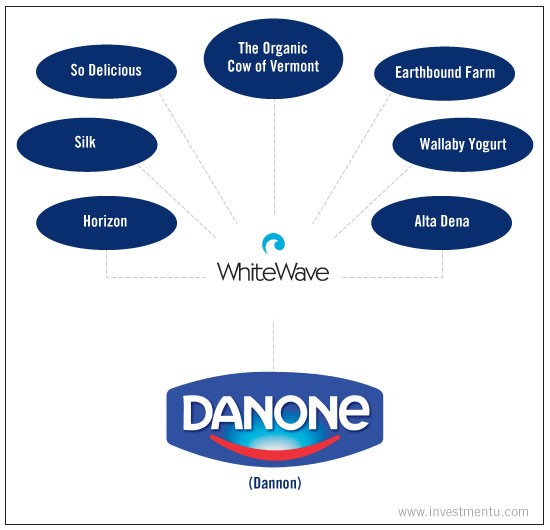America’s growing obsession with organic foods is one of the richest trends in the country. There’s immense investment opportunity - much of it in places most folks would never look.
Organics have grown from a mom-and-pop niche at the local farm market to a billion-dollar cash grab for the “big food” industry.
Most folks don’t know it - because the industrial food giants don’t want you to - but many of the most popular organic brands are now owned by large, multinational conglomerates.
Contrary to the idealistic image in the heads of many shoppers, these homegrown brands are no longer owned by the independent mom working out of her garage. Far from it.
Organics are big business.
As the trend has grown, the big food companies have opened their checkbooks. Nearly every popular organics brand is owned by, dare I say it, an unpopular food giant.
Take a brand as innocent sounding as The Organic Cow of Vermont.
It started small, but eventually was bought by Horizon Organic... which was bought by White Wave (which spun off of Dean Foods)... which was recently bought by the Swiss dairy giant Danone.

And when I told a colleague this week that his wife’s favorite organic snack food brand was actually owned by Pepsi, he was stunned.
So much for that warm and fuzzy feeling we get when we pay more for an organic brand.
Again, this is big business.
The organics industry is quickly turning into the industrial machine so many consumers are looking to avoid. But it has to. The industry is flat-out exploding.
Last year, for example, the traditional food industry grew by a mere 3%.
its pockets.
That’s the chief reason General Mills (NYSE: NYSE:GIS) - which is, against most conceptions, the third-largest organics company in the world - recently announced it will double the amount of organic acreage it works with by 2019.
That’s where the money is at. Land.
Investors who want to get rich from this organics trend will skip the big-name firms and their diversified lineups and go straight to the source... the farmland.
The truth is, we’ve recently entered a serious farmland crisis when it comes to organics.
After years of surging growth, organics comprise 5% of the food sector’s total sales. And yet, just 1% of American farmland is devoted to certifiable farming practices.
It’s great news for landowners.
For instance, my family owns roughly 400 acres of crop and grazing land. It hasn’t seen a chemical in nearly a generation. It’s now worth a premium to organic farmers because chemical-free land is increasingly hard to find.
It’s a similar situation all across the country.
You see, farmers can’t grow organic crops on just any land. No, the ground must meet strict organic standards for three years before it can be certified to grow organic crops. That’s how long the USDA says it takes for non-organic herbicides, pesticides and fertilizers to be cleansed from the fields.
It means there’s a three-year window in which farmers who want to get in the organics game are seeing the smaller yields and higher costs associated with organic farming... and can’t slap that critical margin-boosting label on their product.
It’s a massive three-year hardship. Again, it’s why organic land is selling for a premium.
And it’s why food giants are opening their wallets and giving money to organic farmers.
It’s about to spark the next land boom.
For example, Costco (NASDAQ:COST), which many say is now the leading retailer of organic foods - ousting Whole Foods Market Inc (NASDAQ:WFM) from the position - recently got into the lending business. It lent an undisclosed amount of money to a mid-sized supplier looking to buy organic land in California.
Costco made the loan and now has the first right to the strawberries grown on it.
As more farmers look to turn traditional farmland into organic land, the huge food retailer is ready for more loans. It believes it’s a critical move as farmers deal with that expensive three-year window.
Of course, the competition is getting into the game as well. Whole Foods has lent at least $18 million. And, while I don’t have confirmation of this, it’s safe to say Wal-Mart (NYSE: NYSE:WMT) has cut some checks as well.
These companies have to do it. There simply isn’t enough organic farmland to meet the raging demand from customers.
For investors, the most direct way to profit is to buy some farmland. But the more realistic way to invest is through a farmland REIT like Farmland Partners Inc (NYSE:FPI) or Gladstone Land Corporation (NASDAQ:LAND).
Your timing is good. After rising steadily for the first six months of the year, farm prices have leveled off as crop prices have fallen. This is thanks to rumors of an upcoming record-shattering corn and soybean harvest.
It’s a short-term buying opportunity in a tremendous long-term trend.
As the organic market goes from a nascent subsector to a booming, dominant industry, the folks who own farmland will reap the biggest rewards.
That three-year window acts as a stiff barrier to entry. It ensures money will be flowing for many more years.
Take advantage of it.
